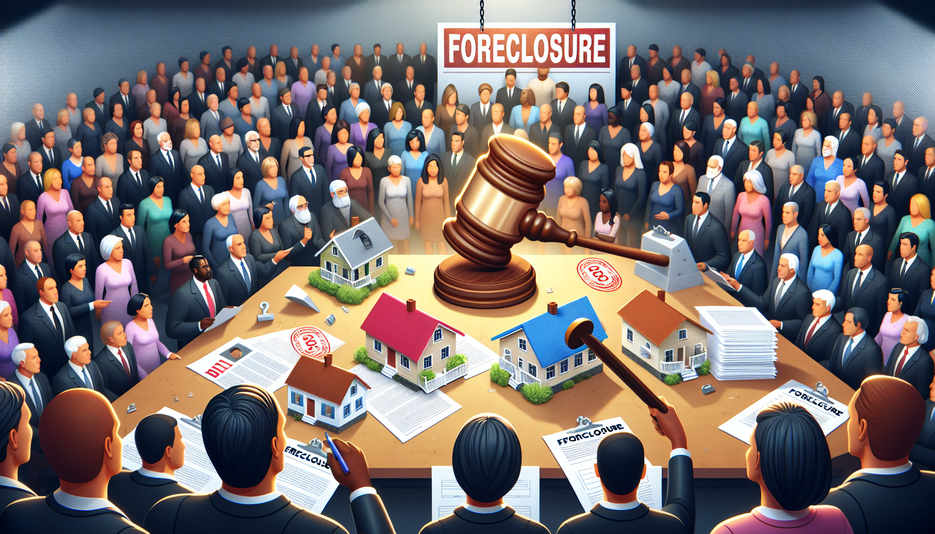Foreclosure Auction Guide: A Comprehensive Resource for Bidding at Foreclosure Auctions
Estimated reading time: 10 minutes
Key Takeaways
- Understand the foreclosure auction process from start to finish.
- Learn essential bidding strategies and preparation tips to succeed at auctions.
- Know the local laws and regulations that shape each auction.
- Discover advanced tactics for competitive bidding and post-auction procedures.
Table of contents
Understanding Foreclosure Auctions
Foreclosure Process Leading Up to the Auction
Foreclosure occurs when a homeowner misses mortgage payments. The process involves:
- Falling behind on payments.
- Lender initiating legal action to recover the debt.
- A period for settlement or court review, leading to an order for auction if unresolved.
- The auction, held to sell the property and recoup funds for the lender.
This foreclosure process is integral to the auction and guides buyers on what to expect.
Types of Properties at Foreclosure Auctions
At these auctions, you may find:
- Homes repossessed due to unpaid mortgages.
- Properties with tax liens or legal judgments.
- Real estate reclaimed by banks or local governments.
Always review the property details, as each comes with its own set of challenges and opportunities. For additional insights, refer to this guide to understanding foreclosure.
Local Laws and Regulations
Local rules vary widely:
- Notice requirements differ: official postings vs. local newspapers.
- Participant qualifications: some areas require proof of cash or certified funds.
- Rules that shape bidding procedures and auction conduct.
Understanding these is crucial to navigating a foreclosure auction successfully. More details can be found in this foreclosure guide.
Navigating the Foreclosure Auction Process
Step-by-Step Guide to the Auction Process
The auction process unfolds in clear steps:
-
Public Announcement:
- Auction details are announced through official notices, public records, and local newspapers.
- This wide notice ensures all interested buyers know when and where to participate.
Reference: Pennymac Guide and NY Foreclosure Factsheet.
-
Setting the Opening Bid:
- The lender sets a minimum, or opening bid, covering the remaining debt and fees.
- Concepts such as “reserve price” are used to protect the lender's interests.
Learn more at Upsolve.
-
The Bidding Event:
- Buyers attend the auction in person with cash or certified funds.
- Bids are placed live, with the auctioneer guiding the process.
For further details, check Upsolve's resource.
Key Auction Terms Explained
Familiarize yourself with these essential terms:
-
Reserve Price/Opening Bid: The minimum acceptable bid set by the lender.
More info: Homelight Auction Insights
-
Absolute Bid: The final, winning bid which is binding.
Source: Homelight
-
Minimum Bid: The smallest amount required to participate.
Refer to Homelight for details.
How to Prepare for a Foreclosure Auction
Preparation is key to successful bidding. Follow these steps:
-
Set a Budget:
Know your spending limit and stick to it.
-
Arrange Your Funding:
Secure cash funds or get pre-approved for a home loan. More guidance available at Upsolve.
-
Do Your Homework:
Attend auctions as an observer, learn the auction lingo, and research the property history.
-
Prepare a Checklist:
- Maximum bid amount
- Financing or cash documentation
- Local auction laws and property details
How to Bid at Foreclosure Auctions
Effective bidding is both an art and a strategy:
-
Analyze the Property:
Review comparable sales, inspect the property condition, and note any needed repairs. See more on Homelight.
-
Enter the Auction Confidently:
Signal your bid clearly, stay calm, and adhere to your predetermined maximum bid.
-
Bidding Tactics:
- Follow the auctioneer’s cues.
- Know when to step back and avoid bidding wars.
Auction Strategies for Foreclosures
For experienced bidders looking to gain an edge, consider these advanced strategies:
-
Develop a Clear Bidding Plan:
Set your maximum bid and account for additional expenses like repairs. More insights can be found on Homelight.
-
Analyze Your Competition:
Understanding other bidders can inform your strategy—know when to bid or hold back.
-
Adjust for Market Conditions:
Monitor local property trends and be flexible with your strategy.
-
Evaluate the Risks:
Beware of hidden costs, potential repair fees, and title issues. Learn more from this resource.
-
Seek Expert Assistance:
Consider consulting a real estate agent experienced in foreclosure auctions.
Post-Auction Considerations
-
Payment Procedures:
Most auctions require prompt payment. Be prepared to pay in cash or with a certified check. Refer to Upsolve for details.
-
Securing the Property:
Ensure you receive all necessary legal documents and inspect the property early.
-
Title and Legal Review:
Review legal documents to confirm a clear title. More information is available at FHF Audit Guide.
-
Managing Post-Auction Tasks:
Register your deed, store documentation safely, and consult experts if needed.
Conclusion
This guide has provided a comprehensive overview of foreclosure auctions, from understanding the process and preparing effectively to bidding strategically and handling post-auction tasks. With careful research, disciplined bidding, and clear planning, you can navigate the challenges and capitalize on the opportunities offered by foreclosure auctions.
Call to Action
Stay informed and prepared for your next auction:
- Subscribe to our blog for more real estate tips and guides.
- Download our free “Foreclosure Auction Checklist” for a step-by-step bidding plan.
- Leave your questions or share your auction experiences in the comment section.
Remember: Knowledge, preparation, and strategy are key to success in foreclosure auctions. Good luck with your bidding journey!
Frequently Asked Questions
-
What is a foreclosure auction?
An auction where properties are sold when homeowners fail to meet mortgage obligations. For more details, read this guide.
-
How do I prepare financially for an auction?
Set a strict budget and arrange your funding (cash or pre-approved loan). Review tips on Upsolve.
-
What are the risks involved in foreclosure bidding?
Risks include hidden repair costs, title issues, and legal complications. Make sure to perform thorough due diligence as outlined in our guide.

